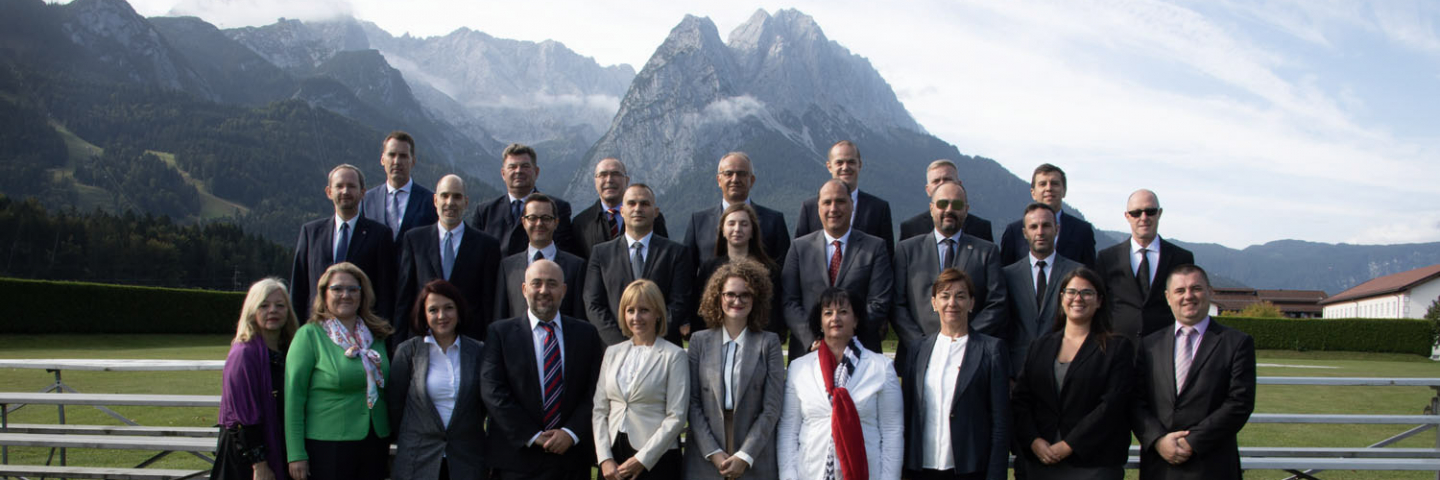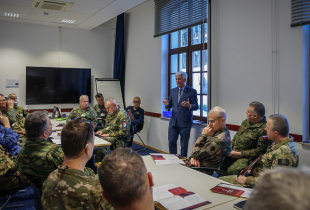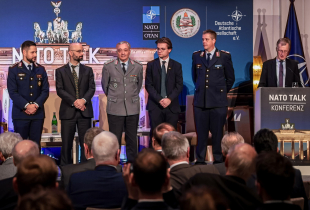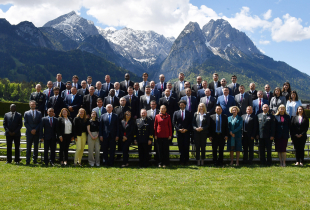
Marshall Center Hosts Next Steps toward NATO for Republic of North Macedonia
By Christine June
Public Affairs Office
George C. Marshall European Center for Security Studies
GARMISCH-PARTENKIRCHEN, Germany (Sept. 20, 2019) – The Republic of North Macedonia is currently in the process of acceding to NATO as the 30th member state, and the Foreign Policy Special Advisor to the Prime Minister of North Macedonia said the George C. Marshall European Center for Security Studies is helping them to meet standards and to finalize their integration.
The Marshall Center held Next Steps toward NATO, a special seminar for 18 members of the working committee on NATO integration from the Republic of North Macedonia Sept. 19 and 20 at the Marshall Center here.
“This was a very useful seminar because it provided us with in-detail explanation of the functioning structures of NATO, including very important specific issues like NATO defense planning process,” said the Foreign Policy Special Advisor to the Prime Minister of North Macedonia, Dr. Dane Taleski, who is also the acting national NATO coordinator for North Macedonia.
The Marshall Center conducted a previous seminar of this type at the North Macedonia Parliament at the end of May.
“These members from North Macedonia represented most of the different ministries, the Prime Minister's office and the Armed Forces, and are all very much involved in managing their respective agencies’ and ministries’ work in NATO integration,” said Dr. Matthew Rhodes, Marshall Center’s area studies chair at the College of International and Security Studies. “The goal is to provide some practical support to these officials who are managing their country's entry into NATO.”
The Marshall Center has a network of almost 14,000 security professionals from 155 nations. Out of that number, almost 250 are from North Macedonia, including a few who attended this seminar.
The Marshall Center has also conducted outreach programs for North Macedonia. This includes a pair of seminars with members of the Assembly of the Republic of North Macedonia (Parliament) the past two years and a workshop in Skopje this past March as part of the Marshall Center’s Balkans 360 regional initiative.
In addition, the Marshall Center Alumni Association of North Macedonia organized the seventh annual Ohrid Alumni Security Forum at Lake Ohrid in North Macedonia last month.
“As you see, this particular seminar continues a strong tradition of Marshall Center engagement with North Macedonia,” said retired U.S. Air Force Brig. Gen. Dieter Bareihs, the Marshall Center’s deputy director. “It continues a strong tradition of mutual dialogue, cooperation and trust, and comes at a historic time for your country.”
Following an agreement in June 2018 to rename the country, the permanent representatives to NATO of the member states signed a protocol on the accession of North Macedonia to NATO on Feb. 6. All member states need to ratify before North Macedonia can join the Alliance. According to Taleski and his fellow colleagues at the seminar, 22 of the 29 NATO member states have ratified it.
“NATO Allies’ invitation to join them as NATO’s 30th member confirmed both the hard work you have done to prepare for membership and North Macedonia’s promise and potential to add to NATO’s strength as we confront this century’s security challenges together,” Bareihs said. “This seminar supports doing precisely that.”
The first lecture was on North Macedonia’s NATO accession, which was an overview of the strategic context to include current security challenges, North Macedonia’s achievements with NATO, and remaining steps and tasks.
Next topic was on how NATO works, which covered the alliance’s organizational structures and decision-making processes on paper and in practice, including military advice and command structures, national and international coordination, and how member states approach participation.
Other topics included NATO finance and budgeting, NATO defense planning process, and strategic communications, hybrid threats and NATO membership.
Most of the rest of the seminar focused on lectures sharing experiences from new allies with NATO accession and membership. This included narratives from Slovak Republic, Republic of Croatia and Republic of Slovenia.
“This seminar allowed us to hear and understand the first-hand experiences from member states that entered NATO recently,” Taleski said. “We heard about the path they took, what their challenges were and how they overcame those challenges.”
He stressed, “That was really essential to build our institutional capacities and to be able to cope with the full obligations from NATO membership.”


